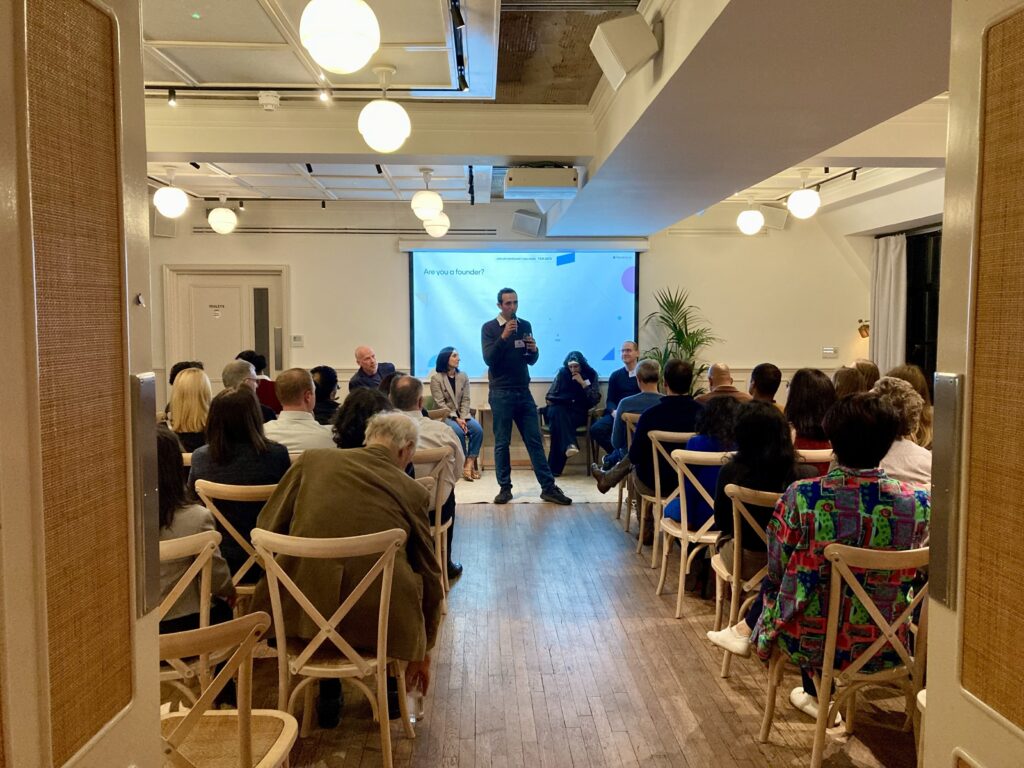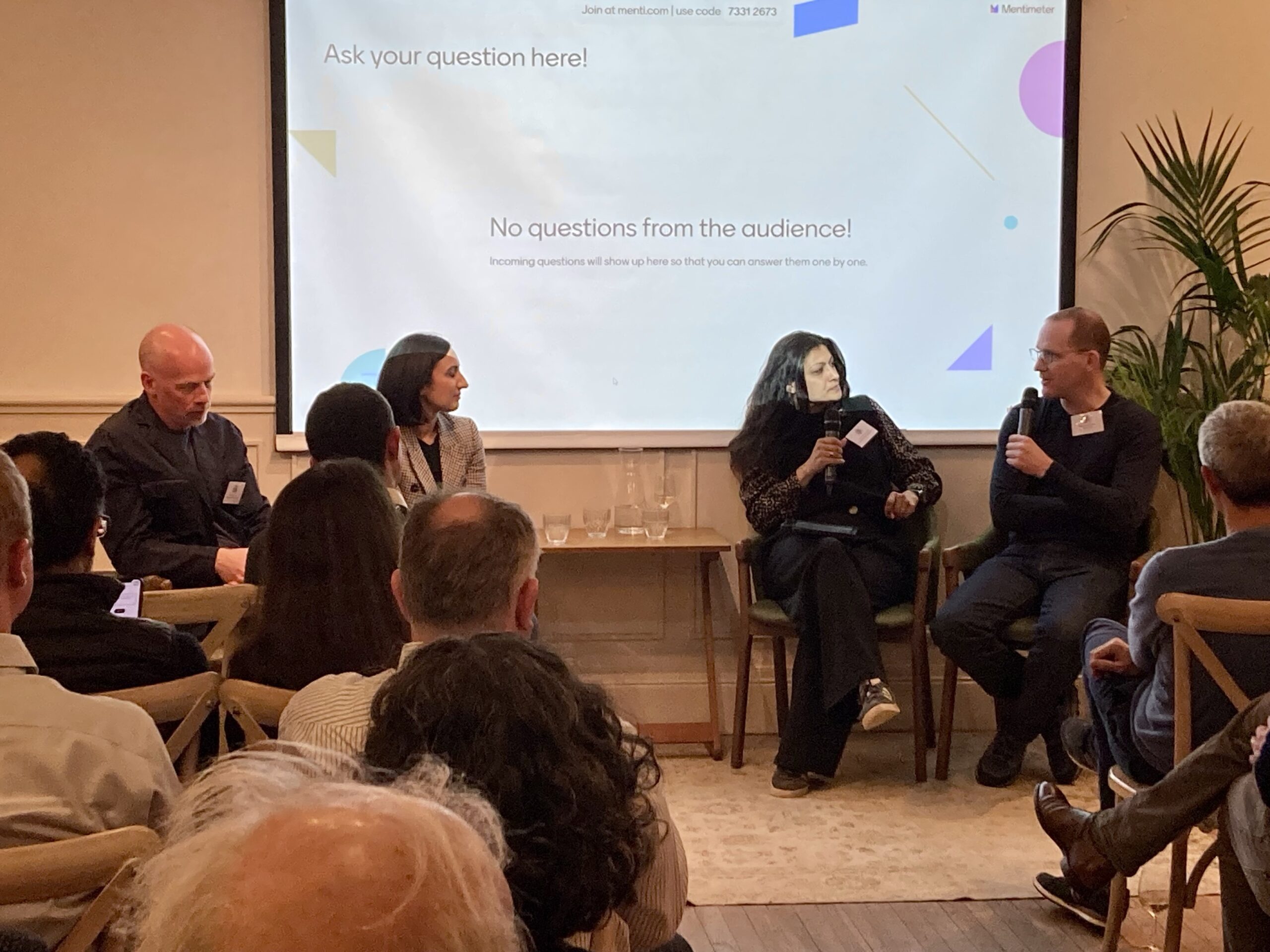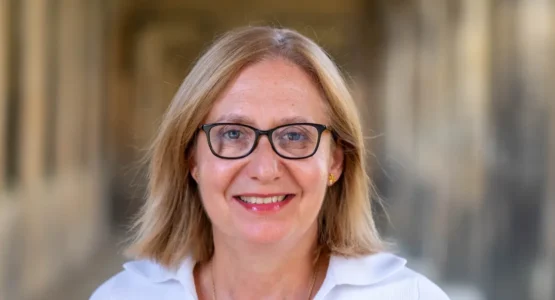Three Johnian entrepreneurs share career insights at panel discussion
Three well-known Johnian entrepreneurs shared key lessons from their career journeys at a panel discussion earlier this month. The speakers were Jon Wright (1991, innocent drinks, JamJar Investments), Simone Maini (2001, Elliptic) and Matej Pfajfar (1999, Monzo), who talked about creating a company culture and the challenges they faced as entrepreneurs.
The alumni event, which took place at Mortimer House in London on Thursday 6 March was chaired by Johnian journalist Anushka Asthana (1998), who is the is Deputy Political Editor at ITV News and co-presenter on ITV’s flagship political programme, Peston.
The audience heard from Jon Wright, who is best known as one of the three Johnian co-founders of innocent drinks, now the biggest juice brand in Europe. He led the commercial team and then international expansion up until the business sale to Coca-Cola in 2013. He read Economics at St John’s College, where he met his future business partners Adam Balon (1991) and Richard Reed (1991).

Jon, Adam and Richard also co-founded Jam Jar Investments, an early-stage European consumer VC fund. Over the last decade JamJar has backed more than 80 companies such as Deliveroo, Tony’s Chocolonely, Lucky Saint, Runna, Wild and what3words.
He explained how during the sale of innocent drinks to Coca Cola the founders insisted that the company culture was maintained as it was part of the reason the business had become so successful.
Also giving her insights was Simone Maini, CEO of Elliptic. Founded in 2013, Elliptic pioneered the use of blockchain analytics for financial crime compliance. They are the leading provider of crypto compliance solutions globally. She spoke about how to maintain a company culture as the business scales, explaining that while some things that make sense in small companies are not transferable to larger ones, other aspects of culture will remain non-negotiable.
And Matej Pfajfar, who is Chief Technology Officer at Monzo, the UK’s largest digital bank with more than eight million customers, discussed his career progression following his Computer Science degree. Before joining Monzo, Matej was an Engineering Director at Google from 2018, where he focused on enabling machine learning on Android devices and expanding Android’s protected computing capabilities. He also led engineering and data science teams responsible for Android’s telemetry and diagnostics platforms. Prior to that, Matej was the Executive Director of Adacta, where he led the development of one of the top-rated core systems for insurance.
Unique company cultures should be nurtured and should grow and sometimes change with the company
He told the audience that workplace perks such as free lunches and table tennis are not what makes the culture and that Monzo makes decisions other companies may not because of its focus on customers.
Student attendee Michael Lawson-Falomo (2022) said: ‘The event was incredibly valuable. Hearing from all the Johnian entrepreneurs provided a fascinating insight into the entrepreneurial mindset, especially around resilience, adaptability and the importance of your work culture. One of the key takeaways for me was the emphasis on identifying a clear problem before developing a solution – that’s something I’ll definitely apply moving forward, and also the importance of culture to the longevity of a business.
‘I’m already exploring entrepreneurship through my work with We Dey (a cultural production company) and building Ladder (a credit solutions platform), and this event really reinforced my passion for building solutions that have a meaningful impact. The advice on balancing vision with practical execution was particularly useful, and I’m excited to apply those insights to my current and future venture.’
Attendee Dr Liisa Van Vliet (2002), Senior Researcher and EU Network Manager at the Department of Biochemistry, said: ‘The discussion was warm, insightful and seamlessly mediated by Anushka, and it was encouraging to hear the panellists honestly share their thoughts on company culture. I was particularly impressed by the kind nature and humanity of all three panellists: indeed one of the main themes was that, despite creating a family feel to young companies, the employees should be hired to achieve the companies’ goals. Unique company cultures should be nurtured and should grow and sometimes change with the company – each company will have their own culture and values but clear communication and frequent feedback is key to maintaining these.’





